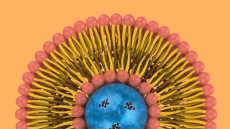Vitamin C in a fatty stomach may encourage cancer growth
upper stomach may cause vitamin C to promote cancer-causing
reactions rather than protect against them as previously found.
Scientists at the University of Glasgow conducted an in vitro study measuring the nitrosation of four secondary amino compounds, amines, under conditions simulating the upper (proximal) stomach. Nitrosation is the chemical process whereby nitrites react with amines and are converted into carcinogenic nitroso compounds. The researchers set about to investigate the link due to what they called an "alarming" increase in the incidence of adenocarcinomas of the upper stomach. While the cause of this increasing rate is unclear, they said, the cancers generally occur in healthy acid-secreting stomachs, suggesting the cause is environmental. "Understanding the factors affecting gastric nitrite chemistry is therefore relevant to our understanding the development of malignancies of the upper stomach," the authors wrote. Nitrites access the stomach via saliva as well through certain processed foods. Vitamin C can convert nitrite to nitric oxide and thereby prevent the formation of harmful nitrosamines, which are formed when exposed to stomach acid. However, the Glasgow researchers found that nitric oxide can diffuse into fat and react with oxygen to then form nitrosoamine-generating chemicals. Without fat, vitamin C lowered the presence of two nitrosamines by between five and 1000 times and completely eliminated the production of the other two. "In the experiments performed in the absence of lipid, the addition of ascorbic acid (vitamin C) effectively prevented the nitrosation of the amines," wrote the researchers. The team then added ten percent fat, which resulted in vitamin C boosting the nitrosamine production by eight and 140 times. Fat remains in the proximal stomach for some time after a meal and also makes up a substantial amount of the cells lining the stomach, according to the authors. As such, they expect some of these results to carry through to the next level of research. "The transforming role of lipids is likely to be relevant to the in vivo situation as lipid is present in the proximal stomach for a considerable time after eating and is also an important component of the epithelial membranes," concluded the authors. Earlier this year, one of the researchers - Emilie Combet from the University of Glasgow - presented research findings at the annual main meeting of the Society for Experimental Biology, revealing vitamin C reduced the formation of potentially carcinogenic nitrogen-containing compounds in the stomach. Combet had found that vitamin C inhibited this conversion by approximately 99.7 percent, thereby offering potential protection from stomach cancer-causing compounds. Research has also linked vitamin C to lowering the incidence of mouth and kidney cancer. Source: Combet Emilie, et al. "Fat transforms ascorbic acid from inhibiting to promoting acid-catlysed N-nitrosation." Online First Gut 2007; doi: 10.1136/gut.2007.12857.











